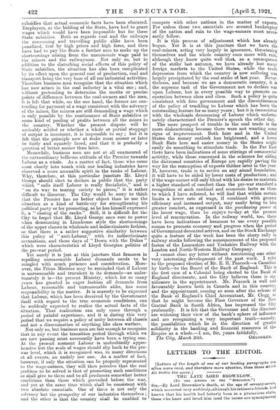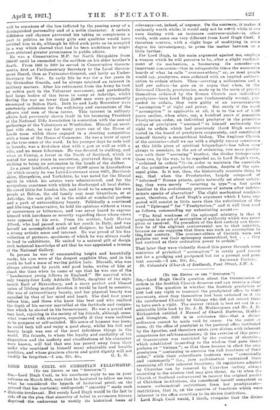fill treble the space. j
will be conscious of the loss inflicted by the passing away of a distinguished personality and of a noble character. A certain diffidence) and- shyness prevented his taking so conspicuous a part in politics as his many gifts and qualities would have entitled him to do, although he filled such posts as he occupied in a way which showed• that had he been ambitious he might have attained greater prominence in public affairs.
He was a Conservative M.P. for North Shropshire from 1866-67 until he succeeded to the earldom on his elder brother's death. From 1885 to 1889 he served in Conservative Govern- ments, first as- Parliamentary Secretary to the Local Govern- ment Board, then as Paymaster-General, and lastly as Under-
Secretary for War. In early life he was for a few years in the Grenadier Guards, and he always retained an interest in military matters. After his retirement from the Army he took an active part in the Volunteer movement, and periodically had large bodies of this form in camp at Ashridge, whilst during the war no fewer than 25,000 men were permanently encamped in Belton Park.- Both he and Lady Brownlow were
constantly- solicitous for the well-being and recreations of the officers and men of these forces. This interest in military
affairs had previously shown itself in his • becoming President
of the National Rifle Association in connexion with the annual gatherings of the Volunteers at Wimbledon. Himself an excel- lent rifle shot, he- was for many years one of the House of
Lords team which there engaged• in a shooting competition with a team of the House of Commons. He was a lover of sport
in the true sense of the word. In his younger days he rode well to hounds, was a first-class shot with a gun as well as with a rifle, and no mean fisherman. He was devoted to stalking, and when at Canisp, a forest in the North of Scotland, which he rented for many years in succession, preferred doing his own stalking to being an automaton in the hands of the stalker.
As a great landlord, owning-over 58,000-acres in Lincolnshire (of which county he was Lord-Lieutenant since 1867); Hertford-
shire, Shropshire, and Yorkshire, he was noted for the liberal spirit in which his estates were `administered, and for the scrupulous exactness with-which he discharged all local duties.
He cared little for London life, and loved to be among his own people at Belton, the old family seat near Grantham, or at Ashridge, the vast pile set in the midst of wonderful gardens and a park of extraordinary beauty. Politically a convinced and life-long Conservative, he held his opinions without a trace of narrowness• or bitterness, and was never heard to express himself with harshness or severity regarding those whose views were opposed to his own. From his mother, Lady Marion Alford,- who had passed much of her youth in Italy, and was herself an accomplished artist and designer, he had imbibed a strong artistic sense and interest. He was proud of his fine collection of pictures, specimens of which he was always ready to lend to-exhibitions. He united to .a natural gift of design such technical knowledge of art that he was appointed a trustee of the National Gallery.
In person he was of commanding height and beautifully made; his eyes were of the deepest sapphire blue, and in his youth he had a mass of waving golden hair. Disraeli, who was always attracted by youth and good looks, writes of him at about the time .when he came of age that he was one of the- " handsomest young fellows in England." HO married when
only twenty-four Lady Adelaide Talbot, daughter of the eigh- teenth Earl of Shrewsbury, and a more perfect and blessed union of lifelong mutual devotion it would. be hard to conceive. She was of extraordinary beauty, and her physical beauty was equalled .by that of her mind and heart. She died four years before him, and those who knew him best and who realized the depth of his sorrow marvelled at the fortitude and resigna- tion which he showed in his bereavement. He was a genial and easy host; rejoicing in the society of his friends, although some- what reserved with strangers, especially if they were inclined to be pompous or self-satisfied.- His sense of humour was keen; he could both tell • and enjoy a good story, whilst his full and hearty laugh was one of the, most infectious things in the world. His friends, to whom the loyalty and cordiality of his disposition and the modesty and steadfastness of his character- were known, will feel that one has passed away from their midst who combined in himself many admirable and lovable qualities, and whose-gracious charm and quiet dignity will not



































 Previous page
Previous page